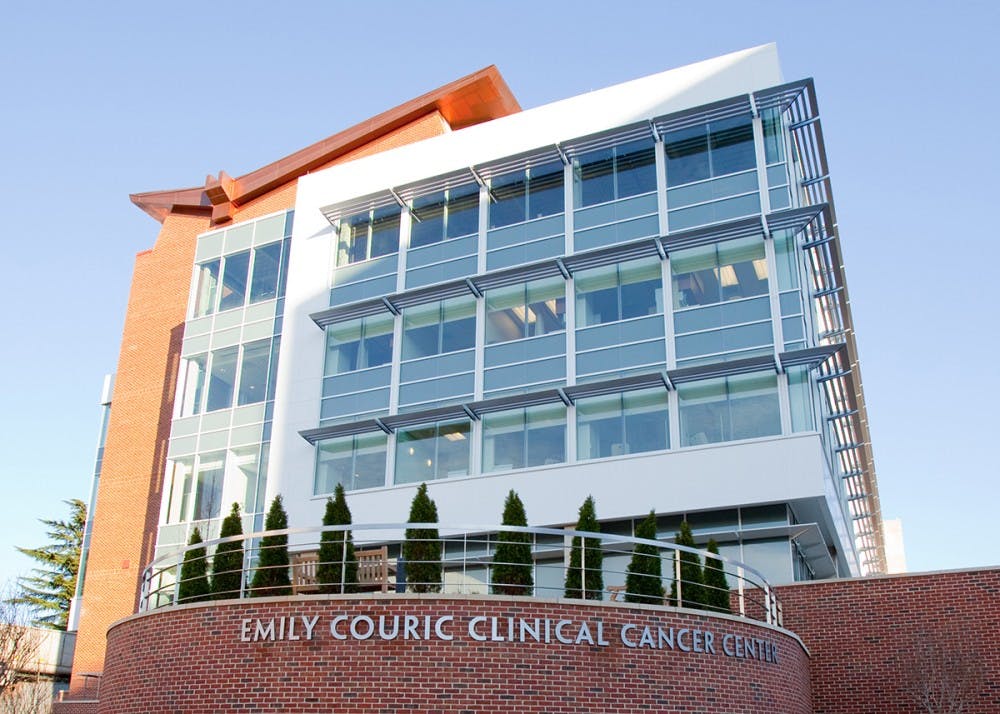The University Hospital Cancer Center was recently ranked in the top 100 health care systems with oncology programs across the country for the fifth year in a row by Becker’s Hospital Review. The University Hospital moved up in the U.S. World & News Report rankings as well, rising from No. 31 to No. 30 for the top 50 cancer centers.
Administrator of cancer services Jody Reyes said that the recognition on these lists reflects the work put in by the team at the cancer center.
“We've been working so hard to create a great environment for our patients, for our families,” Reyes said. “[And] create not only the clinical expertise that they deserve, but the research that goes along with that. And then trying to create the patient experience where when they come there, they feel very cared for and they feel that we are really right there besides them as they are taking this journey.”
University Cancer Center Director Thomas Loughran Jr. compared the center making the Becker’s top 100 list to making the World Series five years in a row. When Loughran joined the University Hospital four years ago, the Cancer Center was ranked No. 67 by U.S. World & News Report. Then two years ago, the University’s cancer center moved up from No. 67 to No. 31 — a significant jump according to Loughran.
According to Reyes, the University cancer program differentiates itself from other programs in that its physicians are all specialized in particular diseases and diagnoses. For example, there are surgeons that only operate on patients with breast cancer. Furthermore, the specialty teams are expanding as the University hospital is recruiting more doctors, according to Loughran.
According to Reyes, several of the oncology programs also involve an outreach aspect. For instance, the breast program educates members of the community about breast exams and screenings. Furthermore, the federally funded program Every Woman’s Life is administered through the University so that uninsured women are able to get mammograms and other screening services. The lung cancer program is also working with smaller hospitals in Southwest Virginia to help diagnose lung cancer in the earlier stages.
The Cancer Center also follows a high-tech and high-touch model, according to Reyes. High-tech model involves the use of new and innovative technologies to treat patients, while the high-touch model involves establishing a more intimate relationship with patients.The hospital takes a comprehensive approach by providing psychosocial services that help the patient along with clinical treatment to the patients.
“We can have … the cutting-edge research, have the cutting-edge treatment, but if a patient is so sick that they can't eat, then having those treatments does us no good,” Reyes said. “Or if the patient is so depressed that we can't encourage them to come in for their appointment, it doesn't matter. It doesn't matter whether we have those wonderful therapies or not because we're not going to be able to actually give them.”
According to Loughran, Becker’s Hospital Review also acknowledged the research contributions of the University Cancer Center. The center managed to double the number of patients in clinical trials in the past five years. Furthermore, the center is part of the Oncology Research Information Exchange Network — a program designed to profile individual tumors so people can receive more targeted treatments. The University program only started a year and a half ago, and it has already treated 2,000 consenting patients.
The Cancer Center is working towards getting a higher level of designation from the National Cancer Institute. The center is one of the 69 hospitals that is recognized as a cancer center by the NCI, but it wants to become one of the 45 comprehensive cancer centers across the country. One way in which they are trying to expand on the research side is through population research.
“[Population research] is basically aimed at healthy lifestyles, cancer prevention, cancer survivorship, cancer genetics, genetic risk for everyone — not just the patient with cancer, but the entire population of the Commonwealth that we serve,” Loughran said.
On the clinical side, the center is trying to expand to accommodate growth. It plans on accomplishing this by opening up the fourth floor of the Emily Couric Clinical Cancer Center as well as moving more patients into the new hospital tower that is going up.
“We will never stop [improving our programs],” Reyes said. “Part of the discouragement — in some ways — in the world that we live in is that cancer is everywhere. And we are approaching it from both the treatment aspects as well as the research aspects.”







